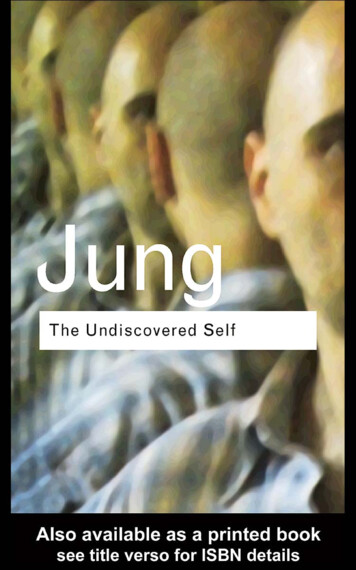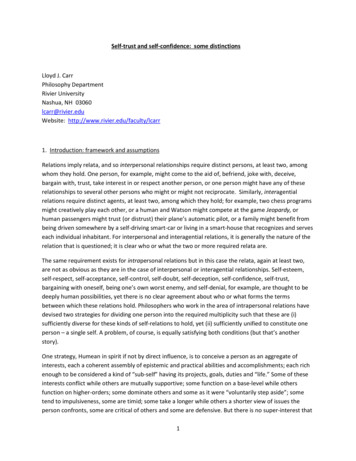
Transcription
The Undiscovered Self‘Do you hate being treated as an object in the organisational systems of bureaucrats and politicians? Does thehard sell of today’s mass consumerism repel you? Are youless than enthusiastic for the wonders of technology? Areyou deeply suspicious of globalisation and all that attendsit? Are you worried about the future of humanity on thisravaged planet? In this path-breaking text, C.G. Jung setsout in the clearest possible terms what one has to do, as anindividual, to stand up to these trends in contemporarysociety.’Andrew Samuels, Professor of Analytical Psychology,University of Essex‘The plight of our civilization, accurately diagnosed byJung in Modern Man in Search of a Soul, is here presentedas a specifically individual struggle for moral and spiritualintegrity against the ‘mass psychology’ generated bypolitical fanaticism, scientific materialism and technological triumphalism on a global scale. Ultimately, this is areligious as much as a psychological problem, which is notsolved by passive adoption of some established creed, butby opening oneself up to the ‘religious instinctive attitude’and inner symbolic vitality possessed by each and everyone of us by virtue of our humanity. One of Jung’s mostprofound, yet accessible, texts.’Anthony Stevens
Carl GustavJungThe Undiscovered SelfLondon and New York
Gegenwart und Zukunft first published 1957by Rascher, ZurichEnglish edition first published 1958by Routledge & Kegan PaulFirst published in Routledge Classics 2002by Routledge11 New Fetter Lane, London EC4P 4EERoutledge is an imprint of the Taylor & Francis GroupThis edition published in the Taylor & Francis e-Library, 2005.“To purchase your own copy of this or any of Taylor & Francis or Routledge’scollection of thousands of eBooks please go to www.eBookstore.tandf.co.uk.” 1958 Carl Gustav JungAll rights reserved. No part of this book may be reprintedor reproduced or utilised in any form or by any electronic,mechanical, or other means, now known or hereafterinvented, including photocopying and recording, or inany information storage or retrieval system, withoutpermission in writing from the publishers.British Library Cataloguing in Publication DataA catalogue record for this book is available from the British LibraryISBN 0-203-99427-2 Master e-book ISBNISBN 0–415–27838–4 (hbk)ISBN 0–415–27839–2 (pbk)
To my friend Fowler McCormick
C ONTENTS1234567The Plight of the Individual in Modern SocietyReligion as the Counterbalance toMass-MindednessThe Position of the West on the Question ofReligionThe Individual’s Understanding of HimselfThe Philosophical and the PsychologicalApproach to LifeSelf-KnowledgeThe Meaning of Self-Knowledge1132331516375
1THE PLIGHT OF THEINDIVIDUAL INMODERN SOCIETYWhat will the future bring? From time immemorial this question has occupied men’s minds, though not always to thesame degree. Historically, it is chiefly in times of physical,political, economic and spiritual distress that men’s eyes turnwith anxious hope to the future, and when anticipations,utopias and apocalyptic visions multiply. One thinks, forinstance, of the chiliastic expectations of the Augustan age atthe beginning of the Christian Era, or of the changes in thespirit of the West which accompanied the end of the firstmillennium. Today, as the end of the second millenniumdraws near, we are again living in an age filled with apocalyptic images of universal destruction. What is the significance of that split, symbolized by the “Iron Curtain,” which1
the undiscovered selfdivides humanity into two halves? What will become of ourcivilization, and of man himself, if the hydrogen bombs beginto go off, or if the spiritual and moral darkness of Stateabsolutism should spread over Europe?We have no reason to take this threat lightly. Everywhere inthe West there are subversive minorities who, sheltered byour humanitarianism and our sense of justice, hold theincendiary torches ready, with nothing to stop the spread oftheir ideas except the critical reason of a single, fairly intelligent, mentally stable stratum of the population. One shouldnot, however, overestimate the thickness of this stratum. Itvaries from country to country in accordance with nationaltemperament. Also, it is regionally dependent on public education and is subject to the influence of acutely disturbingfactors of a political and economic nature. Taking plebiscitesas a criterion, one could on an optimistic estimate put itsupper limit at about 40 per cent of the electorate. A rathermore pessimistic view would not be unjustified either, sincethe gift of reason and critical reflection is not one of man’soutstanding peculiarities, and even where it exists it proves tobe wavering and inconstant, the more so, as a rule, the biggerthe political groups are. The mass crushes out the insight andreflection that are still possible with the individual, and thisnecessarily leads to doctrinaire and authoritarian tyranny if everthe constitutional State should succumb to a fit of weakness.Rational argument can be conducted with some prospectof success only so long as the emotionality of a given situationdoes not exceed a certain critical degree. If the affectivetemperature rises above this level, the possibility of reason’shaving any effect ceases and its place is taken by slogans andchimerical wish-fantasies. That is to say, a sort of collectivepossession results which rapidly develops into a psychic2
the plight of the individual in modern societyepidemic. In this state all those elements whose existence ismerely tolerated as asocial under the rule of reason come tothe top. Such individuals are by no means rare curiosities tobe met with only in prisons and lunatic asylums. For everymanifest case of insanity there are, in my estimation, at leastten latent cases who seldom get to the point of breaking outopenly but whose views and behavior, for all their appearanceof normality, are influenced by unconsciously morbid andperverse factors. There are, of course, no medical statistics onthe frequency of latent psychoses – for understandablereasons. But even if their number should amount to less thanten times that of the manifest psychoses and of manifestcriminality, the relatively small percentage of the populationfigures they represent is more than compensated for by thepeculiar dangerousness of these people. Their mental state isthat of a collectively excited group ruled by affective judgments and wish-fantasies. In a state of “collective possession”they are the adapted ones and consequently they feel quite athome in it. They know from their own experience the language of these conditions and they know how to handlethem. Their chimerical ideas, upborne by fanatical resentment, appeal to the collective irrationality and find fruitfulsoil there, for they express all those motives and resentmentswhich lurk in more normal people under the cloak of reasonand insight. They are, therefore, despite their small number incomparison with the population as a whole, dangerous assources of infection precisely because the so-called normalperson possesses only a limited degree of self-knowledge.Most people confuse “self-knowledge” with knowledge oftheir conscious ego personalities. Anyone who has any egoconsciousness at all takes it for granted that he knows himself.But the ego knows only its own contents, not the unconscious3
the undiscovered selfand its contents. People measure their self-knowledge bywhat the average person in their social environment knows ofhimself, but not by the real psychic facts which are for themost part hidden from them. In this respect the psychebehaves like the body with its physiological and anatomicalstructure, of which the average person knows very little too.Although he lives in it and with it, most of it is totallyunknown to the layman, and special scientific knowledge isneeded to acquaint consciousness with what is known of thebody, not to speak of all that is not known, which also exists.What is commonly called “self-knowledge” is therefore avery limited knowledge, most of it dependent on social factors, of what goes on in the human psyche. Hence one isalways coming up against the prejudice that such and such athing does not happen “with us” or “in our family” oramong our friends and acquaintances, and on the other hand,one meets with equally illusory assumptions about thealleged presence of qualities which merely serve to cover upthe true facts of the case.In this broad belt of unconsciousness, which is immune toconscious criticism and control, we stand defenseless, open toall kinds of influences and psychic infections. As with all dangers, we can guard against the risk of psychic infection onlywhen we know what is attacking us, and how, where andwhen the attack will come. Since self-knowledge is a matter ofgetting to know the individual facts, theories help very littlein this respect. For the more a theory lays claim to universalvalidity, the less capable it is of doing justice to the individualfacts. Any theory based on experience is necessarily statistical;that is to say, it formulates an ideal average which abolishes allexceptions at either end of the scale and replaces them by anabstract mean. This mean is quite valid, though it need4
the plight of the individual in modern societynot necessarily occur in reality. Despite this it figures in thetheory as an unassailable fundamental fact. The exceptions ateither extreme, though equally factual, do not appear in thefinal result at all, since they cancel each other out. If, forinstance, I determine the weight of each stone in a bed ofpebbles and get an average weight of 145 grams, this tells mevery little about the real nature of the pebbles. Anyone whothought, on the basis of these findings, that he could pick up apebble of 145 grams at the first try would be in for a seriousdisappointment. Indeed, it might well happen that howeverlong he searched he would not find a single pebble weighingexactly 145 grams.The statistical method shows the facts in the light of theideal average but does not give us a picture of their empiricalreality. While reflecting an indisputable aspect of reality, itcan falsify the actual truth in a most misleading way. This isparticularly true of theories which are based on statistics. Thedistinctive thing about real facts, however, is their individuality. Not to put too fine a point on it, one could say that the realpicture consists of nothing but exceptions to the rule, andthat, in consequence, absolute reality has predominantly thecharacter of irregularity.These considerations must be borne in mind wheneverthere is talk of a theory serving as a guide to self-knowledge.There is and can be no self-knowledge based on theoreticalassumptions, for the object of self-knowledge is an individual– a relative exception and an irregular phenomenon. Hence itis not the universal and the regular that characterize the individual, but rather the unique. He is not to be understood as arecurrent unit but as something unique and singular which inthe last analysis can neither be known nor compared withanything else. At the same time man, as member of a species,5
the undiscovered selfcan and must be described as a statistical unit; otherwisenothing general could be said about him. For this purpose hehas to be regarded as a comparative unit. This results in auniversally valid anthropology or psychology, as the case maybe, with an abstract picture of man as an average unit fromwhich all individual features have been removed. But it isprecisely these features which are of paramount importancefor understanding man. If I want to understand an individualhuman being, I must lay aside all scientific knowledge of theaverage man and discard all theories in order to adopt a completely new and unprejudiced attitude. I can only approachthe task of understanding with a free and open mind, whereasknowledge of man, or insight into human character, presupposesall sorts of knowledge about mankind in general.Now whether it is a question of understanding a fellowhuman being or of self-knowledge, I must in both cases leaveall theoretical assumptions behind me. Since scientific knowledge not only enjoys universal esteem but, in the eyes ofmodern man, counts as the only intellectual and spiritualauthority, understanding the individual obliges me to commit lèse majesté, so to speak, to turn a blind eye to scientificknowledge. This is a sacrifice not lightly made, for the scientific attitude cannot rid itself so easily of its sense of responsibility. And if the psychologist happens to be a doctor whowants not only to classify his patient scientifically but also tounderstand him as a human being, he is threatened with aconflict of duties between the two diametrically opposed andmutually exclusive attitudes of knowledge, on the one hand,and understanding, on the other. This conflict cannot besolved by an either-or but only by a kind of two-waythinking: doing one thing while not losing sight of the other.In view of the fact that in principle, the positive6
the plight of the individual in modern societyadvantages of knowledge work specifically to the disadvantage ofunderstanding, the judgment resulting therefrom is likely to besomething of a paradox. Judged scientifically, the individualis nothing but a unit which repeats itself ad infinitum andcould just as well be designated with a letter of the alphabet.For understanding, on the other hand, it is just the uniqueindividual human being who, when stripped of all those conformities and regularities so dear to the heart of the scientist,is the supreme and only real object of investigation. The doctor, above all, should be aware of this contradiction. On theone hand, he is equipped with the statistical truths of hisscientific training, and on the other, he is faced with the taskof treating a sick person who, especially in the case of psychicsuffering, requires individual understanding. The more schematicthe treatment is, the more resistances it – quite rightly – callsup in the patient, and the more the cure is jeopardized. Thepsychotherapist sees himself compelled, willy-nilly, to regardthe individuality of a patient as an essential fact in the pictureand to arrange his methods of treatment accordingly. Today,over the whole field of medicine, it is recognized that the taskof the doctor consists in treating the sick person, not anabstract illness.This illustration in the case of medicine is only a specialinstance of the problem of education and training in general.Scientific education is based in the main on statistical truthsand abstract knowledge and therefore imparts an unrealistic,rational picture of the world, in which the individual, as amerely marginal phenomenon, plays no role. The individual,however, as an irrational datum, is the true and authenticcarrier of reality, the concrete man as opposed to the unrealideal or normal man to whom the scientific statements refer.What is more, most of the natural sciences try to represent the7
the undiscovered selfresults of their investigations as though these had come intoexistence without man’s intervention, in such a way that thecollaboration of the psyche – an indispensable factor –remains invisible. (An exception to this is modern physics,which recognizes that the observed is not independent of theobserver.) So in this respect, too, science conveys a picture ofthe world from which a real human psyche appears to beexcluded – the very antithesis of the “humanities.”Under the influence of scientific assumptions, not only thepsyche but the individual man and, indeed, all individualevents whatsoever suffer a leveling down and a process ofblurring that distorts the picture of reality into a conceptualaverage. We ought not to underestimate the psychologicaleffect of the statistical world picture: it displaces the individual in favor of anonymous units that pile up into massformations. Science supplies us with, instead of the concreteindividual, the names of organizations and, at the highestpoint, the abstract idea of the State as the principle of politicalreality. The moral responsibility of the individual is theninevitably replaced by the policy of the State (raison d’état).Instead of moral and mental differentiation of the individual,you have public welfare and the raising of the living standard.The goal and meaning of individual life (which is the only reallife) no longer lie in individual development but in the policyof the State, which is thrust upon the individual from outsideand consists in the execution of an abstract idea which ultimately tends to attract all life to itself. The individual is increasingly deprived of the moral decision as to how he should livehis own life, and instead is ruled, fed, clothed and educated asa social unit, accommodated in the appropriate housing unit,and amused in accordance with the standards that give pleasure and satisfaction to the masses. The rulers, in their turn, are8
the plight of the individual in modern societyjust as much social units as the ruled and are distinguishedonly by the fact that they are specialized mouthpieces of theState doctrine. They do not need to be personalities capable ofjudgment, but thoroughgoing specialists who are unusableoutside their line of business. State policy decides what shallbe taught and studied.The seemingly omnipotent State doctrine is for its partmanipulated in the name of State policy by those occupyingthe highest positions in the government, where all the poweris concentrated. Whoever, by election or caprice, gets into oneof these positions is no longer subservient to authority, for heis the State policy itself and within the limits of the situationcan proceed at his own discretion. With Louis XIV he can say,“L’état c’est moi.” He is thus the only individual or, at any rate,one of the few individuals who could make use of their individuality if only they knew how to differentiate themselvesfrom the State doctrine. They are more likely, however, to bethe slaves of their own fictions. Such one-sidedness is alwayscompensated psychologically by unconscious subversive tendencies. Slavery and rebellion are inseparable correlates.Hence, rivalry for power and exaggerated distrust pervade theentire organism from top to bottom. Furthermore, in order tocompensate for its chaotic formlessness, a mass always produces a “Leader,” who almost infallibly becomes the victim ofhis own inflated ego-consciousness, as numerous examples inhistory show.This development becomes logically unavoidable themoment the individual masses together with others andbecomes obsolete. Apart from agglomerations of huge massesof people, in which the individual disappears anyway, oneof the chief factors responsible for psychological massmindedness is scientific rationalism, which robs the9
the undiscovered selfindividual of his foundations and his dignity. As a social unithe has lost his individuality and become a mere abstractnumber in the bureau of statistics. He can only play the role ofan interchangeable unit of infinitesimal importance. Lookedat rationally and from outside, that is exactly what he is, andfrom this point of view it seems positively absurd to go ontalking about the value or meaning of the individual. Indeed,one can hardly imagine how one ever came to endow individual human life with so much dignity when the truth to thecontrary is as plain as the palm of your hand.Seen from this standpoint, the individual really is of diminishing importance and anyone who wished to dispute thiswould soon find himself at a loss for arguments. The fact thatthe individual feels himself or the members of his familyor the esteemed friends in his circle to be important merelyunderlines the slightly comic subjectivity of his feeling. Forwhat are the few compared with ten thousand or a hundredthousand, let alone a million? This recalls the argument of athoughtful friend with whom I once got caught up in a hugecrowd of people. Suddenly he exclaimed, “Here you have themost convincing reason for not believing in immortality: allthose people want to be immortal!”The bigger the crowd the more negligible the individualbecomes. But if the individual, overwhelmed by the sense ofhis own puniness and impotence, should feel that his life haslost its meaning – which, after all, is not identical with publicwelfare and higher standards of living – then he is already onthe road to State slavery and, without knowing or wanting it,has becomes its proselyte. The man who looks only outsideand quails before the big battalions has no resource withwhich to combat the evidence of his senses and his reason.But that is just what is happening today: we are all fascinated10
the plight of the individual in modern societyand overawed by statistical truths and large numbers and aredaily apprised of the nullity and futility of the individualpersonality, since it is not represented and personified by anymass organization. Conversely, those personages who strutabout on the world stage and whose voices are heard far andwide seem, to the uncritical public, to be borne along onsome mass movement or on the tide of public opinion and forthis reason are either applauded or execrated. Since mass suggestion plays the predominant role here, it remains a mootpoint whether their message is their own, for which they arepersonally responsible, or whether they merely function as amegaphone for collective opinion.Under these circumstances it is small wonder that individual judgment grows increasingly uncertain of itself andthat responsibility is collectivized as much as possible, i.e., isshuffled off by the individual and delegated to a corporatebody. In this way the individual becomes more and more afunction of society, which in its turn usurps the function ofthe real life carrier, whereas, in actual fact, society is nothingmore than an abstract idea like the State. Both are hypostatized, that is, have become autonomous. The State in particular is turned into a quasi-animate personality from whomeverything is expected. In reality it is only a camouflage forthose individuals who know how to manipulate it. Thus theconstitutional State drifts into the situation of a primitiveform of society, namely, the communism of a primitive tribewhere everybody is subject to the autocratic rule of a chief oran oligarchy.11
2RELIGION AS THECOUNTERBALANCE TOMASS-MINDEDNESSIn order to free the fiction of the sovereign State – in otherwords, the whims of those who manipulate it – from everywholesome restriction, all sociopolitical movements tendingin this direction invariably try to cut the ground from underthe religions. For, in order to turn the individual into a functionof the State, his dependence on anything beside the State mustbe taken from him. But religion means dependence on andsubmission to the irrational facts of experience. These do notrefer directly to social and physical conditions; they concernfar more the individual’s psychic attitude.But it is possible to have an attitude to the external conditions of life only when there is a point of reference outsidethem. The religions give, or claim to give, such a standpoint,13
the undiscovered selfthereby enabling the individual to exercise his judgment andhis power of decision. They build up a reserve, as it were,against the obvious and inevitable force of circumstances towhich everyone is exposed who lives only in the outer worldand has no other ground under his feet except the pavement.If statistical reality is the only reality, then it is the sole authority. There is then only one condition, and since no contrarycondition exists, judgment and decision are not onlysuperfluous but impossible. Then the individual is bound tobe a function of statistics and hence a function of the State orwhatever the abstract principle of order may be called.The religions, however, teach another authority opposed tothat of the “world.” The doctrine of the individual’s dependence on God makes just as high a claim upon him as theworld does. It may even happen that the absoluteness of thisclaim estranges him from the world in the same way he isestranged from himself when he succumbs to the collectivementality. He can forfeit his judgment and power of decisionin the former case (for the sake of religious doctrine) quite asmuch as in the latter. This is the goal the religions openlyaspire to unless they compromise with the State. When theydo, I prefer to call them not “religions” but “creeds.” A creedgives expression to a definite collective belief, whereas theword religion expresses a subjective relationship to certainmetaphysical, extramundane factors. A creed is a confessionof faith intended chiefly for the world at large and is thus anintramundane affair, while the meaning and purpose ofreligion lie in the relationship of the individual to God (Christianity, Judaism, Islam) or to the path of salvation and liberation (Buddhism). From this basic fact all ethics is derived,which without the individual’s responsibility before God canbe called nothing more than conventional morality.14
religion as the counterbalance to mass-mindednessSince they are compromises with mundane reality, thecreeds have accordingly seen themselves obliged to undertakea progressive codification of their views, doctrines and customs and in so doing have externalized themselves to such anextent that the authentic religious element in them – theliving relationship to and direct confrontation with theirextramundane point of reference – has been thrust into thebackground. The denominational standpoint measures theworth and importance of the subjective religious relationshipby the yardstick of traditional doctrine, and where this is notso frequent, as in Protestantism, one immediately hears talk ofpietism, sectarianism, eccentricity, and so forth, as soon asanyone claims to be guided by God’s will. A creed coincideswith the established Church or, at any rate, forms a publicinstitution whose members include not only true believersbut vast numbers of people who can only be described as“indifferent” in matters of religion and who belong to itsimply by force of habit. Here the difference between a creedand a religion becomes palpable.To be the adherent of a creed, therefore, is not always areligious matter but more often a social one and, as such, itdoes nothing to give the individual any foundation. For support he has to depend exclusively on his relation to an authority which is not of this world. The criterion here is not lipservice to a creed but the psychological fact that the life of theindividual is not determined solely by the ego and its opinions or by social factors, but quite as much, if not more, by atranscendent authority. It is not ethical principles, howeverlofty, or creeds, however orthodox, that lay the foundationsfor the freedom and autonomy of the individual, but simplyand solely the empirical awareness, the incontrovertibleexperience of an intensely personal, reciprocal relationship15
the undiscovered selfbetween man and an extramundane authority which acts as acounterpoise to the “world” and its “reason.”This formulation will not please either the mass man or thecollective believer. For the former the policy of the State isthe supreme principle of thought and action. Indeed, thiswas the purpose for which he was enlightened, and accordingly the mass man grants the individual a right to exist onlyin so far as the individual is a function of the State. Thebeliever, on the other hand, while admitting that the State hasa moral and factual claim, confesses to the belief that not onlyman but the State that rules him is subject to the overlordshipof “God” and that, in case of doubt, the supreme decision willbe made by God and not by the State. Since I do not presumeto any metaphysical judgments, I must leave it an open question whether the “world,” i.e., the phenomenal world ofman, and hence nature in general, is the “opposite” of God ornot. I can only point to the fact that the psychological opposition between these two realms of experience is not onlyvouched for in the New Testament but is still exemplified veryplainly today in the negative attitude of the dictator States toreligion, and of the Church to atheism and materialism.Just as man, as a social being, cannot in the long run existwithout a tie to the community, so the individual will neverfind the real justification for his existence, and his own spiritual and moral autonomy, anywhere except in an extramundane principle capable of relativizing the overpoweringinfluence of external factors. The individual who is notanchored in God can offer no resistance on his own resourcesto the physical and moral blandishments of the world. For thishe needs the evidence of inner, transcendent experiencewhich alone can protect him from the otherwise inevitablesubmersion in the mass. Merely intellectual or even moral16
religion as the counterbalance to mass-mindednessinsight into the stultification and moral irresponsibility of themass man is a negative recognition only and amounts to notmuch more than a wavering on the road to the atomization ofthe individual. It lacks the driving force of religious conviction, since it is merely rational. The dictator State has onegreat advantage over bourgeois reason: along with the individual it swallows up his religious forces. The State has takenthe place of God; that is why, seen from this angle, the socialist dictatorships are religions and State slavery is a form ofworship. But the religious function cannot be dislocated andfalsified in this way without giving rise to secret doubts,which are immediately repressed so as to avoid conflict withthe prevailing trend towards mass-mindedness. The result, asalways in such cases, is overcompensation in the form offanaticism, which in its turn is used as a weapon for stampingout the least flicker of
body, not to speak of all that is not known, which also exists. What is commonly called “self-knowledge” is therefore a very limited knowledge, most of it dependent on social fac-tors, of what goe










